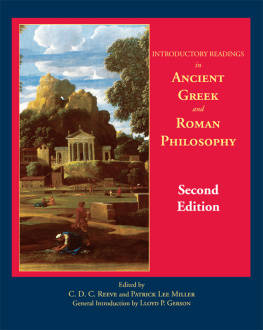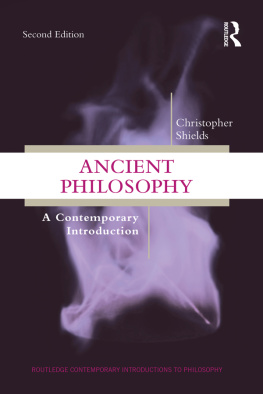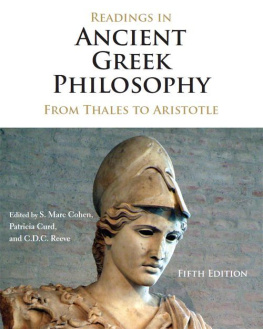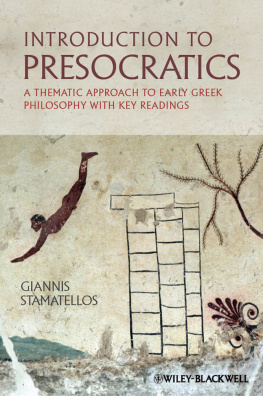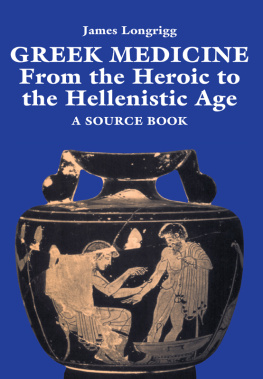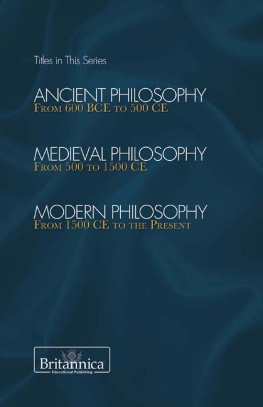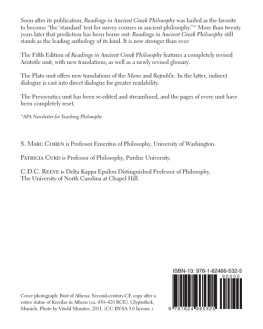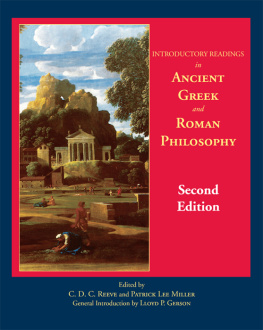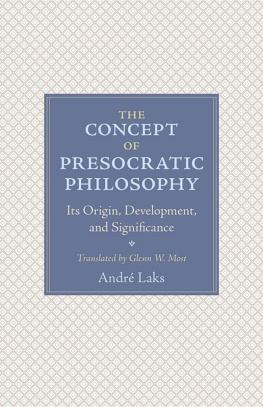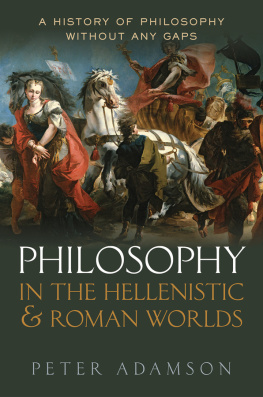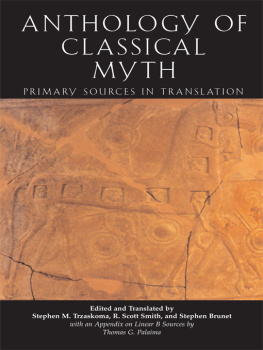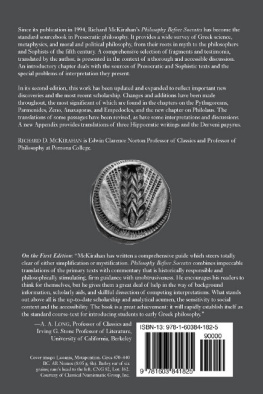
I NTRODUCTORY R EADINGS
IN
A NCIENT G REEK AND
R OMAN P HILOSOPHY
I NTRODUCTORY R EADINGS
IN
A NCIENT G REEK AND
R OMAN P HILOSOPHY
S ECOND E DITION
E DITED BY
C.D.C. R EEVE AND P ATRICK L EE M ILLER
W ITH A G ENERAL I NTRODUCTION BY
L LOYD P. G ERSON
Hackett Publishing Company, Inc.
Indianapolis/Cambridge
Copyright 2015 by Hackett Publishing Company, Inc.
C.D.C. Reeves translation of Platos Meno, first published in this volume, is copyright 2006 by Hackett Publishing Company, Inc. All rights reserved.
All rights reserved
Printed in the United States of America
19 18 17 16 15 1 2 3 4 5 6 7
For further information, please address:
Hackett Publishing Company, Inc.
P.O. Box 44937
Indianapolis, IN 46244-0937
www.hackettpublishing.com
Cover design by Brian Rak
Text design by Meera Dash
Library of Congress Cataloging-in-Publication Data
Introductory readings in ancient Greek and Roman philosophy / Edited by C.D.C. Reeve and Patrick Lee Miller; With a General Introduction by Lloyd P. Gerson. Second Edition.
pages cm
ISBN 978-1-62466-352-9 (pbk.) ISBN 978-1-62466-353-6 (cloth)
1. Philosophy, AncientSources. I. Reeve, C. D. C., 1948 editor. II. Miller, Patrick L. (Patrick Lee), 1970 editor. III. Gerson, Lloyd P., writer of introduction.
B504.I58 2015
180dc23 2014029056
ePub ISBN: 978-1-62466-416-8
Lloyd P. Gerson
A NCIENT PHILOSOPHY EXTENDS roughly from 600 BCE to 600 CE. During this very long period, philosophy as we know it today was invented, and its fundamental problems or areas of concern established. The history of philosophy from 600 CE up to the present is more or less constituted by a series of engagements with the ancient philosophical agenda.
Before We Begin
A student of ancient Greek and Roman philosophical writings has to be as attuned to the historical circumstances surrounding them as to the philosophical arguments they contain. In this regard, there is nothing special about these writings; we could say as much about those produced at any other time and place. There are, however, special problems about these writings and our ability to study them. These derive from the complex path leading from the moment they were first set down to now, when a modern English translation of some version of that original text is published.
Almost all of these texts were originally written on papyrus, although there are a few examples that were carved in stone. Papyrus is the writing material named after the Egyptian plant from which it comes. After its surface was prepared, it was then rolled up into a fairly standard size. The ancient Greek word biblos is the term for this plant and writing surface. It survives in our words bibliography and Bible. Early in the Christian era the supply of papyrus became unreliable, and authors shifted to sheepskin or goatskin, which was cut into sheets and bound with some sort of covering; hence, the origin of the modern book. The technique was supposedly developed in Pergamum, a city in Asia Minor. The English word parchment comes from the Latin word for this city. Both of these materials are subject to decay and decomposition, so that we have extremely few samples of writings that actually date back to the ancient period.
These papyrus rolls and sheepskin books were each unique exemplars of the authors work, potentially available for copying. As philosophers rose and fell in popularity, their works might be widely copied or not at all. The great libraries of the ancient world were the preserve of such works as had been copied on demand by whoever sponsored the library. The manuscript copies of the original works (or copies of earlier copies, and so on) that are available to us mainly go back no further than the ninth century CE, and most are from several centuries later than that.
Beginning with the invention of the printing press around 1450, scholars began to make editions of the works of the ancient authors based on an examination of some or all of the manuscripts then known. Not surprisingly, manuscripts sometimes differ in their readings, that is, in what the copyist put down. Modern editors have to try to figure out which manuscript retains the best reading the one most accurately representing what the author of the work actually wrote. This is a demanding technical job, especially for authors of philosophical works in which exact wording often makes all the difference.
These Renaissance editions are the starting point for the classical scholarship that is the backbone of the study of ancient philosophy. Only through editions like these can we hope to {x} understand what the authors were trying to say. Since the late fifteenth century, many, many successive editions of single works have appeared, frequently based on more manuscripts or on more accurate reading of existing manuscripts. Most scholars today use editions of ancient works that go back no further than the nineteenth century, though there are some exceptions.
From this brief account, it should be evident already that there are numerous pitfalls in working back from a contemporary English translation of, say, a work of Aristotle to what Aristotle intended to convey. In addition, there is a problem of a different and even more serious nature, namely, that with two notable exceptions, we do not possess all the works of any ancient philosopher. In some cases, we possess only fragments of their works. In many cases, we possess nothing more than a name and a reference to the philosophers school affiliation. An educated guess would be that we possess something less than 10 percent of the true body of ancient philosophical writings from our period of study. For example, the indispensable ancient historian of philosophy, Diogenes Laertius (c. 200 CE) tells us that the writings of Epicurus are contained in 300 rolls. At about a dozen ordinary book pages per roll, that would make 3,600 pages. What we possess is a mere 100 pages, much of it fragmentary. Another example: We are told that the great Stoic Chrysippus wrote over 700 rolls. But though a substantial number of fragments are extant, no single complete work of his survives. This sad story can be retold again and again for nearly all of the ancient philosophers. Even our fragmentary evidence is often suspect, moreover, since it frequently comes to us as quotations from hostile later writers, who were not above taking a quotation out of context or misquoting it, either inadvertently or mischievously.
What Is Ancient Philosophy About?
A remarkable feature of ancient philosophy is that, though its agenda of problems, questions, and methods grew and to a certain extent mutated through time, there is something like an ongoing dialogue among its practitioners. This is certainly in part because they had, broadly speaking, a common culture and all knew a common language Greek. It is also because they did not make a sharp separation between thinking about philosophical issues and thinking about what their predecessors thought about these same issues. It is no doubt a much more daunting task today than it was, say, 2,000 years ago to understand the history of a contemporary philosophical problem along with the various solutions offered. As a guide to those encountering ancient philosophical texts for the first time, a few orienting concepts are useful. In fact, there is one in particular that is arguably the central focus of ancient philosophical speculation the concept of nature. Thinking about it will give us a way of beginning to understand how subsequent philosophers appropriated, expanded, and frequently rejected the legacy of their early predecessors.
Next page
